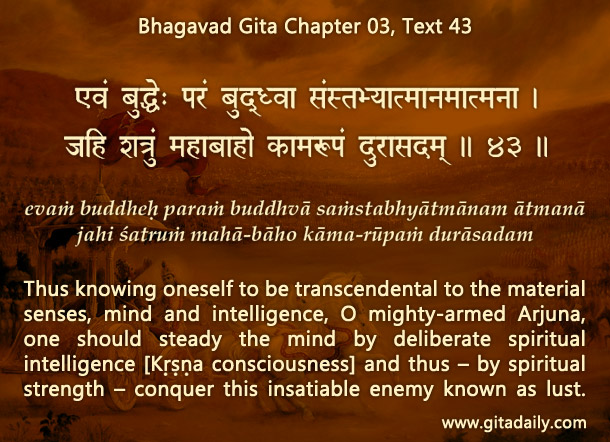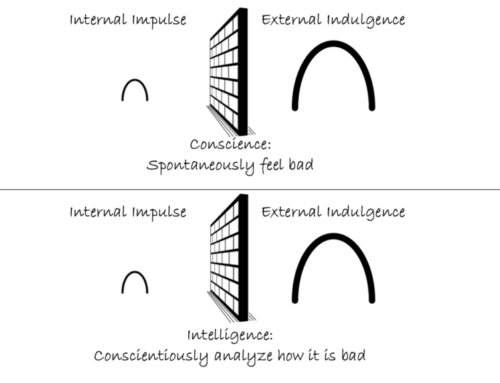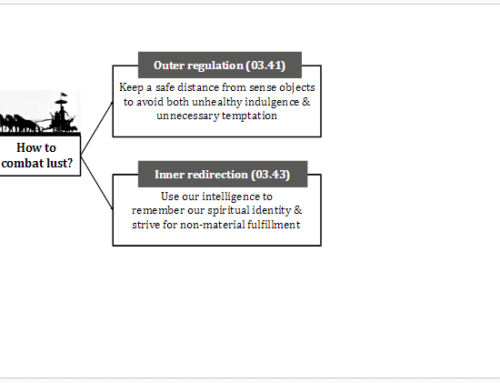To decrease unhealthy reactions increase healthy reminders
Suppose we have some unhealthy habit such as impulsive overeating. Once some behavior becomes ingrained as a habit, we often react without thinking. If some food, even junk food, appears in front of us, we just grab and gulp it.
How can we regulate such unhealthy reactions? One way is by using our intelligence to create healthy reminders. Pertinently, the Bhagavad-gita (03.43) urges us to use our intelligence to discipline our default desires.
Between any stimulus and our response to it is the gap where our free will operates. For our free will to choose wisely, our intelligence is meant to serve as a ready, reliable resource. If our intelligence were active or were activated, it would help us evaluate the stimulus before responding. But when we have unhealthy habits, our intelligence becomes inactive. Even if it gets activated, it is too late – we have already succumbed to a default reaction.
Given that our intelligence won’t function fast enough once we encounter a tempting stimulus, what can we do? Use our intelligence before any encounter with sensory stimuli. How? By intelligently creating timely, thought-provoking reminders for ourselves. Such reminders can be quotes or insights that succinctly state points that inspire or empower us to evaluate our impulses. Those points could center on: what our deepest aspirations are, how we are different from our unhealthy reactions, and how giving in to those reactions deviates and degrades us.
We need to surround ourselves with such reminders, be they stickies in places where we relapse or digital stickies on our devices or memorized nuggets that we can recall instantly. Such reminders will create a wedge between stimulus and reaction, catalyze our intelligence, and raise our self-awareness, thereby equipping us to make healthier choices.
Think it over:
- How can reminders help us in choosing wisely?
- What are the different kinds of reminders? Which reminders work best for you?
- Make three reminders that can help you regulate an unhealthy reaction.
***
03.43 Thus knowing oneself to be transcendental to the material senses, mind and intelligence, O mighty-armed Arjuna, one should steady the mind by deliberate spiritual intelligence [Krishna consciousness] and thus – by spiritual strength – conquer this insatiable enemy known as lust.

To know more about this verse, please click on the image
Explanation of article:
https://www.youtube.com/watch?v=sL_XrNgdt2k&feature=youtu.be
Podcast:



Hare Krishna.
Prabhuji,
pamho, agtSP!!
Thank you so much for giving us Gita Daily for our advancement in Krishna Consciousness.
Prabhu, what is the answer for question “What are the different kinds of reminders?”
Is the correct answer is
“reminders which center on:
a) what our deepest aspirations are
b) how we are different from our unhealthy reactions
c) and how giving in to those reactions deviates and degrades us.”
Prabhuji, kindly confirm.
-Ys,
Subal Sakha Das
Yes
Thank you for such an important lesson! It has filled in an important gap in my process of personal development. Before, I thought that I would set a goal then focus on mindfulness in hopes to minimize reactionary living. These activities were quite helpful however, this lesson’s teaching to “increase healthy reminders” transforms my implementation from passive mindfulness to a proactive process that can direct my attention and reinforce my personal goals.
I have recently discovered Gita Daily. Each teaching is very helpful. It is as if the message was specifically meant for me. Gita Daily’s lessons provide so many wonderful “healthy reminders” for me to use throughout the day. Thank you for making these valuable lessons available! They are positively changing my life.
In gratitude, Ken
Dear Ken, Thanks for your comment. Delighted to have you here and to know that Gitadaily is of service to you. May the Gita’s wisdom continue enriching us all.